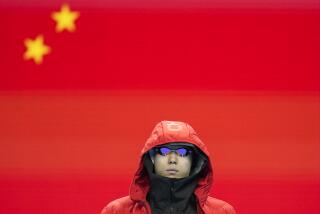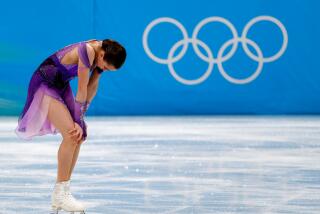Two U.S. Athletes Fail Tests
- Share via
The beleaguered sport of U.S. track and field took another broadside Monday when the sport’s international governing body, the International Amateur Athletic Federation, suspended American shotputter Randy Barnes and sprinter Dennis Mitchell for failing doping tests.
This time, however, U.S. track and field is hitting back, with U.S. Track and Field federation president Craig Masback denouncing the suspensions and saying the federation will not enforce them.
“USATF is concerned and dismayed that the IAAF chose to temporarily suspend two American athletes on the basis of unproven allegations that they have committed a doping offense,” Masback said in a statement. “USATF objects to the IAAF suspensions, and will not enforce them.”
Citing the Amateur Sports Act of 1978, Masback said, “U.S. athletes are entitled to a full and fair hearing prior to being declared ineligible to compete. USATF has on several occasions informed the IAAF of its obligations under the Amateur Sports Act.
“Therefore, we are outraged that the IAAF knowingly breached our confidentiality rules, which were put in place to protect those ultimately determined to be innocent. As is the case with all athletes, these athletes will receive the full support of USATF until such time as it is determined that they have committed a doping offense.”
Masback objects to the IAAF’s decision to suspend Barnes and Mitchell “indefinitely” after completing only one of two steps required before penalizing athletes for the use of banned substances. Two urine samples, A and B, must test positive before an athlete can be sanctioned. If one sample proves positive and the second negative, the first result is thrown out and the athlete is cleared.
Monday, IAAF spokesman Giorgio Reneiri acknowledged that only A samples had tested positive in the cases of Barnes and Mitchell. Results of the B samples--the control samples--are still pending.
The charges are particularly serious for Barnes, who faces a lifetime ban if both tests prove positive, because this would be his second offense.
Barnes, 32, previously was suspended for two years, 1991 and 1992, after testing positive for methyltestosterone at a meet in Malmo, Sweden, in 1990.
This time, in a random out-of-competition test conducted April 1, Barnes tested positive for androstenedione, a banned nutritional supplement. According to IAAF guidelines, a first drug offense carries a two-year suspension, a second offense a lifetime ban.
Barnes is the reigning Olympic shotput champion and holder of both the world outdoor record, 75 feet 10 1/4 inches, and the indoor record, 74-4 1/4.
Mitchell, 32, a 1992 Olympic bronze medalist at 100 meters, was also tested on April 1 and cited for showing too high a level of testosterone.
Because testosterone is a substance that occurs naturally in the body, the B sample is crucial to any kind of a credible doping scan.
Mitchell was notified of his suspension last week after finishing fifth in the 100 meters and running the second leg of the United States’ gold-medal 400-meter relay team at the Goodwill Games.
The suspension explains why he suddenly pulled out of the U.S. Open at Edwardsville, Ill., on Saturday.
The IAAF’s Reneiri told the Associated Press that Mitchell was instructed to “give some medical explanation” for the high testosterone reading. “A few days ago, the explanation was received and the doping commission decided to suspend the athlete.”
Mitchell has never before tested positive for a banned substance and currently serves as chairman of the USATF’s Athletes Advisory Committee, noted for its hard-line stance against doping.
Mitchell and Barnes could not be reached for comment Monday.
News of their IAAF suspensions was released a day after International Olympic Committee President Juan Antonio Samaranch called for the list of banned substances to be “drastically” reduced to exclude drugs that do not jeopardize an athlete’s health.
“Doping demands an exact definition . . . and I have been asking for it for years,” Samaranch told the Spanish newspaper El Mundo.
“Doping is everything that, firstly, is harmful to an athlete’s health and, secondly, artificially augments his performance. If it’s just the second case, for me that’s not doping. If it’s the first case, it is.”
More to Read
Go beyond the scoreboard
Get the latest on L.A.'s teams in the daily Sports Report newsletter.
You may occasionally receive promotional content from the Los Angeles Times.






